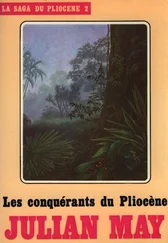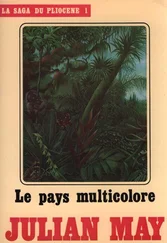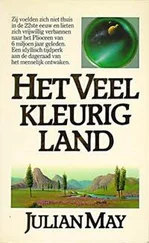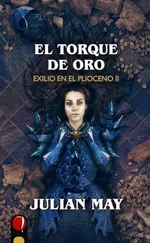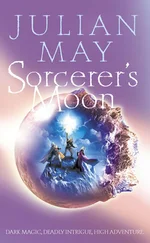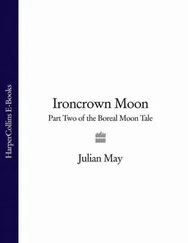Claude left his place of concealment and did a more careful search. The site had been cleaned up by persons who knew their woodcraft, but there remained a few clues. One dusty place bore parallel sweep marks from the branch that had been used to obliterate footprints. And down by the torrent, on a faint game trail that led upstream, was a piece of emerald-green fluff stuck to the resiny trunk of a pine. A bit of green feather. Dyed green. Claude nodded as the puzzle began to resolve itself. They had found three people and three packs and taken them this way. Who? Certainly not the minions of the Tanu, who would not care about concealing their presence. Then…? Firvulag?
Claude’s heart leaped again and he pinched his nostrils shut and exhaled gently. The adrenalin flood was stemmed and the pounding in his chest eased. There was nothing to do but follow. And if they caught him… well, at least he had fulfilled part of what he had come here to do.
“You’re sure you don’t want to get off?” he whispered to the cat, crouching and pulling open the pocket to afford an easy egress. But the animal only blinked its big eyes sleepily and cuddled down out of sight.
“It’s us versus them, then,” Claude said, sighing. He set a good pace and hiked up the noisy river until it was nearly dark. Then he smelled smoke and followed his nose into a stand of sequoias on a rocky slope above the river. There was a sizable fire, surrounded by many dark figures who were laughing and talking.
Claude lurked among the shadows, but he was evidently expected. Completely against his will, he found himself walking up to the fire with his hands above his head, drawn by the same irresistible compulsion he had known in the examining chamber of the Lady Epone.
“It’s an old one!” somebody said as he came into the firelight.
“Not such an alter kocker, though,” a hulking shape remarked. “He might be good for something.”
“Acting more reasonable than his friends, anyhow.”
There were perhaps a dozen tough-looking human men and women seated on the ground around the flames. They were dressed in dark buckskin and oddments of ragged costume, eating the last bits of Felice’s venison and turning a long spit crowded with spatchcocked birds.
One desperado arose and came over to Claude. It was a middle-aged woman of medium height with dark hair graying at the temples and eyes that displayed a fanatic sparkle in the firelight. Her thin lips tightened critically as she studied the old man. She lifted the fine beak of her nose in a proud gesture and Claude could see a golden torc nestled beneath the collar of her doeskin cloak.
“What do you call yourself?” she asked sternly.
“I’m Claude Majewski. What have you done with my friends? Who are you?”
The mind-grip gentled and the woman looked at him with astringent humor. “Your friends are safe enough, Claude Majewski. As for myself, I am Angélique Guderian. You may call me Madame.”
The River Rhône flowed slow and wide. The boat, even with its sail fully spread and its small engine working, was a long time leaving the Isle of Darask behind. The watery plains of the Camargue shimmered with a golden haze that blurred regions a kilometer or so away into an indistinct scrim backdrop. Later, as the boat traveled farther south, the passengers caught sight of mountains on their left and the tops of occasional rock outcroppings in the swamp; but there was no sign of the sea. Handsome little orange-and-blue reedlings and red-headed buntings teetered on the tall papyrus growing beside the river’s main channel. The bubbletop was off all morning and the passengers watched, fascinated, as crocodiles and dugongs cruised around them. Once there was a shoal of marvelous watersnakes, nearly transparent and shining like undulant rainbows beneath the hazy sun.
Around noon they pulled in to another island where more than twenty boats were gathered, cargo craft, small yachts conveying brightly garbed Tanu, larger vessels crowded with silent little ramas sitting five abreast on rows of benches like small unchained galley slaves who had lost their oars. The island had only a few low buildings. Skipper Highjohn explained that they would not disembark here, only stop long enough to reinstall the bubble panels. “Not another damn shoot-the-chutesl” groaned Raimo. He pulled out his flask.
“The very last,” Highjohn soothed him, “and not rough, even though it’s a bit steep. One of the unreconstructed gorfs who piloted Tanu barges through here back in the earliest days of the time-portal named the thing la Glissade Formidable. Sounds classier than the Dreadful Slide, so that’s what we call it today, too.”
Stein, sitting in a seat beside Sukey, looked puzzled. “But we should be in the Rhône delta now. Bang on the Mediterranean shore. What kind of gradient can there be?”
“You’re in for a surprise,” Bryan told him. “I couldn’t believe it myself when the skipper explained it to me. I used to sail the Med, too, you’ll remember. What it adds up to, Stein, is a slight miscalculation on the part of the boffins who drew up our Pliocene maps.”
The workman installing the transparent panels gave the last one a smack and said, “You’re off, Cap’n!”
“Belt in, everyone,” Highjohn ordered. “You come forward, Bryan. You’re gonna love this one.”
A light wind sprang up as they puttered away from the moorage, following in the wake of a thirty-meter barge loaded with metal ingots. The vapors that had obscured their view finally dissipated, and they looked to the south for a first glimpse of the sea.
They saw a cloud.
“What the hell is that?” Stein wondered. “Looks like a plass factory on fire or a big volcano vent. Friggerty cloud goes clear to the tropopause.”
The mast of the riverboat folded and withdrew, and the auxiliary engine cut out. They began to pick up speed. The clumps of marsh grass were more widely spaced now, and the boat followed a marked channel that trended southeastward, close beneath a rounded headland on their left that jutted into the flats as an outlier of the alpine foothills. They were heading directly toward the towering white cloud, picking up speed every minute.
And then Elizabeth said, “Dear Lord. The Mediterranean is gone.”
The barge that was traveling about half a kilometer ahead of them dropped out of sight. To the east and west along the horizon were low points of land, but between them was only a line of water meeting milky sky, having a shallow dip in the center. And there was a sound, a swelling rumble with a hissing component that grew to deafening proportions as they swept closer and closer to la Glissade Formidable, where the wide expanse of the Rhône ended at the continental brink.
Creyn’s mental voice rang in the brains of all the torc-wearers. “Shall I program oblivion?” But they all replied, “No!” for their curiosity was greater than any terror of what lay ahead.
The boat raced over the edge and started down, borne on muddy waters cascading over a steep fan of sediment, plunging at eighty kilometers an hour into the depths of the Empty Sea.
They came to the end of the Glissade after four hours and floated in the pale waters of a great bitter lake. All around them were the many-colored rocks of the continental roots and glistening, fantastically eroded shapes of salt and anhydrite and gypsum. With its bubble panels stowed away, the boat spread its sail and raced along toward the southwest, for it was there that Creyn told them that the capital city of Muriah lay, at the tip of the Balearic Peninsula, which the Tanu called Aven, above the perfect flat of the White Silver Plain.
They traveled for one more day, overcome by the strangeness and the beauty and hardly able to talk about it except for endless exclamations in both the vocal and mental speech, to which Creyn responded, “Yes, it is wonderful. And more to come, more splendid than you can imagine.”
Читать дальше

